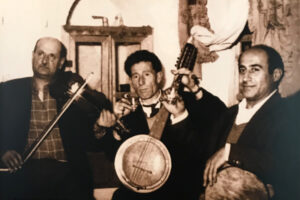Selim Kırılmaz (Ludwig-Maximilians-Universität München, Social and Cultural Anthropology Department)
Music, Migration and Silencing: Memory of the Music of old Mardin and Mihail Kirilmaz

The musicians Cercis Xeco, Corc Kırılmaz, and Yusuf Neceg. The photo was provided by the Kirilmaz family.
In my Ph.D. research, I investigate how the migration of Christians from Mardin/Turkey, which took largely place between the 1940s and 1990s, is remembered in the context of the touristification the old town of Mardin has experienced since the early 2000s.
By the late 1990s and early 2000sTurkey has witnessed the birth of neoliberal cultural politics and a new discourse on “minorities”. In this context, the city of Mardin began to be prioritized as a multicultural, touristic hub. Meanwhile, a protocol for the city’s admission to the UNESCO World Cultural Heritage List was signed in 2000.
During this time, the Syriac community and the city of Mardin gained visibility as a “multicultural” space in Turkish media through tv serial, documentaries, and tourism. However, the history has been concealed that has transformed Mardin into a city that is today all but entirely populated by Muslims.
In this context, my great-uncle Mihail Kırılmaz (1919-1997), a Syriac bard whose songs were recorded in the post-1940s, became an icon of nostalgia for ‘old’ Mardin: his songs were ‘retrieved’ by local musicians, and articles about him began to appear online in the early 2000s. My research explores the songs of ‘old’ Mardin, the musicians involved and their stories. The adjective ‘old’ refers not only to the time when non-Muslims had a significant presence in the city, but also to the historical settlement of Mardin’s city centre, as opposed to the new concrete settlement of Mardin built below the city centre in the 2000s.
In this sense, I take the work and life of Mihail Kırılmaz as my starting point. I focus on the oral history of Christians in old Mardin between 1940 and 1990, a period in which, on the one hand, Mardinite musicians of different ethnic and religious backgrounds recorded much of their music and, on the other hand, most of the city’s Christians were forced to leave the area. In my research, I am simultaneously investigating the silent migration of Mardinite Christians and the impact of current multiculturalist discourses on ‘old’ Mardin and Syriacs. To this end, I have already conducted interviews with family members of the brothers George and Mihail Kırılmaz, Mardinite musicians and music experts, elderly people in the city, and community representatives.For my research methodology, I aim to conceptualize how the songs and quatrains, and the narratives that Mardinites recount about the researched period, shape the affective dimensions of remembering a silenced past. Moreover, because I am an ‘insider’ researcher, this research has the potential to present an opportunity for reflection on the ways of generational transmission of memories and emotions.
By both analyzing music itself and using it in in-depth interviews I am interested in the role of music in navigating social relationships as well as demonstrate its potential as a mnemonic device in conducting oral historical research at a methodological level.
Besides, I hope to contribute to the very limited ethnographical studies on the collective memory of Syriacs in Turkey.
